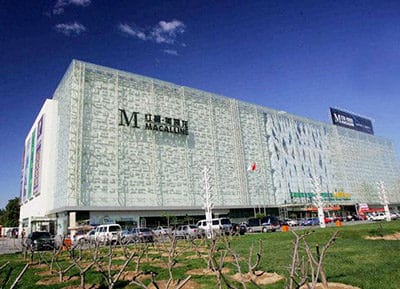
Alibaba’s Jack Ma wants to leverage his online power in offline retail
Alibaba has made another deal aimed at China’s traditional shopping sector, with the e-commerce giant announcing an investment in China’s largest retailer of furniture and home products, as the tech giant, continues to look for ways to leverage its online power and cash resources in offline commerce.
Jack Ma’s tech hegemon this past week purchased RMB 4.36 billion ($630.6 million) of convertible bonds issued by Red Star Macalline Holding Group Company, the privately held holding firm which holds a controlling stake in a chain of 364 home furnishing malls in 199 mainland cities, according to a notice published on the Stock Exchange of Hong Kong on 16 May.
The investment in the Warburg Pincus-backed retail firm, together with related deal for shares in its Hong Kong-listed entity, could pave the way for Alibaba to hold nearly 14 percent of Red Star Macalline. That stake would make it the second-largest owner of China’s biggest home furnishing group, and follows investments by the e-commerce giant in the grocery and hypermarket retail segments in recent years.
Tech Giant Invests in HK and SH-Listed Entities
Should Alibaba’s bonds all be converted at their face value of RMB 12.28 per share, the deal would translate into the tech company taking ownership of approximately 355 million shares in Red Star Macalline Group Corporation Ltd, or around a 10 percent stake in the Shanghai-listed unit of the home furnishing chain, based on its current capitalisation of 3.55 billion shares.

Red Star Macalline operates China’s largest chain of home furnishing malls
Red Star Macalline Holding Group Company is the controlling shareholder in Red Star Macalline Group Corporation Ltd, which is listed on both the Shanghai and Hong Kong exchanges, and Alibaba is also said to be taking a 3.7 percent slice of Red Star Macalline’s Hong Kong-listed shares, according to an account in the mainland media, although neither company has made a statement regarding such a transaction.
After the sale, Warburg Pincus would continue to be the largest shareholder in Red Star Macalline Group Corporation Ltd, having first invested in the company through a 2007 commitment of more than RMB 1 billion, with the US private equity giant currently holding 19.5 percent of the retail chain’s Hong Kong-listed shares, market sources show.
Red Star Macalline Group Corporation declared 2018 revenues of over RMB 14.2 billion and net profit of RMB 4.47 billion, according to its annual report.
Tech Titans in Smart Retail Furniture Fight
As part of the investment deal with Alibaba, Red Star on 15 May agreed to work with the mainland e-commerce pioneer to find ways to improve its furniture products, home furnishing service, shopping malls and other businesses based on operator of Taobao and T-Mall’s experience in e-commerce, said the notice.
While Red Star operates its own branded stores, the company also uses those outlets to anchor its own chain of home furnishing malls in China, where it leases out space to other retailers.
The investment by Alibaba comes after Red Star had in November 2018 reached an agreement to work with the Hangzhou-based firm’s rivals at Tencent to implement “smart retail” strategies including the launch of a Red Star online shopping platform developed by the tech leader.
Now Jack Ma’s cash commitment may help Alibaba to gain an edge over Pony Ma’s Tencent in building ties with China’s biggest furniture seller.
Alibaba Continues to Pursue New Retail
The deal for 13.7 percent of Red Star Macalline continues Jack Ma’s attempt to profit from melding his group’s cash and tech resources with China’s offline retail industry, including joint ventures with theatre chain operator Wanda Film and investments in smart supermarkets.
The Red Star deal counts as Alibaba’s second investment in home furnishing malls, with the company last February having invested RMB 5.45 billion to acquire 15 percent of the furniture retailer’s largest rival — Beijing-based Easyhome.
The series of acquisitions align with a strategy which Jack Ma has dubbed the “new retail” — as ecommerce giants look for opportunities to leverage their online followings to squeeze more value from physical locations, and traditional store operators look to the cloud for ways to bring more customers to their shops and showrooms.
Best known among Alibaba’s “new retail” initiatives are its Hema supermarkets, now renamed as Freshippo, where customers can shop or even dine in the physical store while also inspecting products which they can order online through the retailer’s mobile app, then have the groceries or other items delivered to their homes within 30 minutes.
Leave a Reply